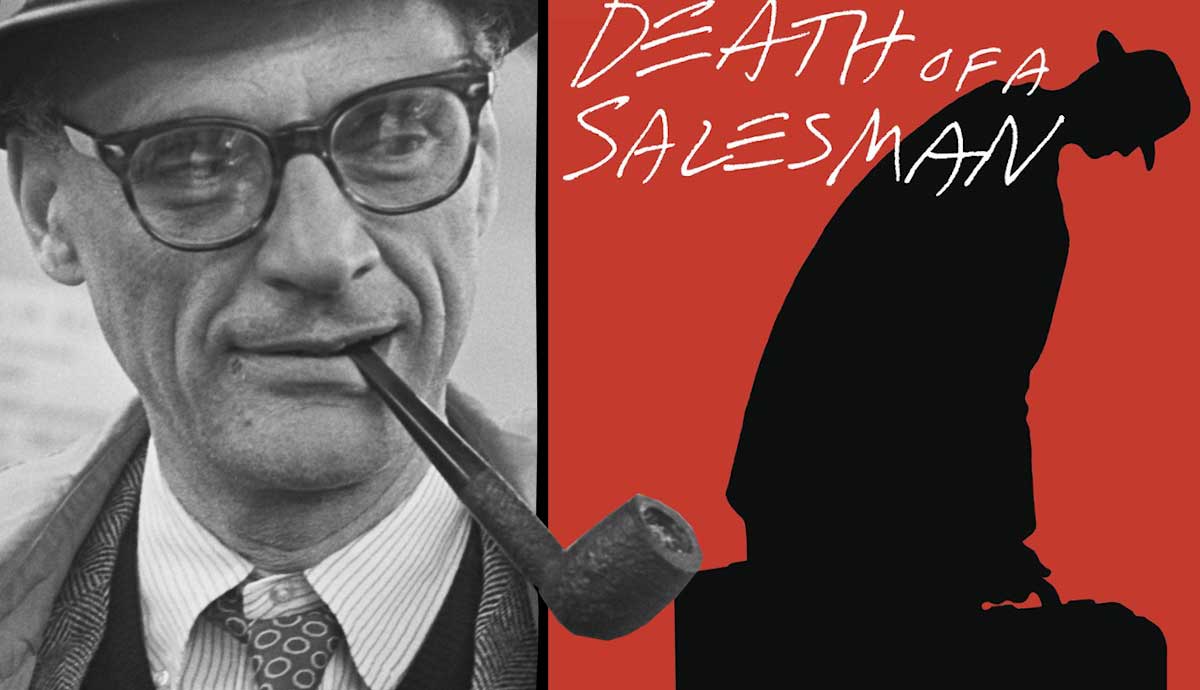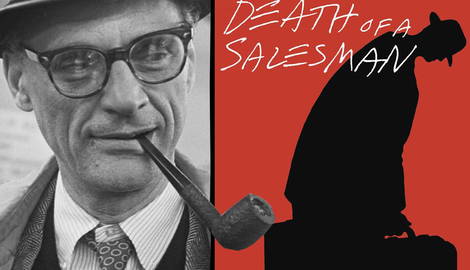
Death of a Salesman is a well-known play written in 1949 by Arthur Miller. The play is a mosaic of dreams, confrontations, arguments, and memories which all play out during the last 24 hours in the life of a salesman called Willy Loman. Willy, his wife Linda, and his sons Happy and Biff form a perpetuating cycle of denial and contradictions which culminate in Willy’s eventual death by suicide. None of the characters are particularly unique and neither are the things that happen in the play. The play is, however, a serious critique of ideology, unachievable expectations, and the myths which keep us all going.
Death of a Salesman by Arthur Miller

On the first enactment of the play Death of Salesman by Arthur Miller, people at the theatre allegedly started crying and they simply couldn’t stop. This phenomenon wasn’t an isolated incident. In the later showings of the play, decades later, people would have the same reaction. What is it about this play that provokes such a strong reaction from people? After all, the play doesn’t belong to the tragedy genre. In fact, the story itself is quite mundane, far from spectacular.
Willy Loman, a marginally successful salesman is concerned about what his son Biff will make of himself. He thinks that Biff is not doing enough to climb up the ladder of the American dream. Happy, Willy’s other son, is happy being a mediocre salesman. Willy’s mental health slowly deteriorates throughout the play, to the point where he eventually takes his own life in a hotel room. The strained family relations slowly break down and cause heated arguments. Willy hopes that his suicide will consequently leave some money for his family through his insurance. On the day of his death, Willy asks for a job from his former employer, Howard. Howard refuses and in a fit of rage, Willy destroys the office. The family gets together after Willy’s death and laments about the life he lived. This is the storyline of the play. So, it isn’t particularly shocking or new. To understand why the audience would have such a reaction, we need to dig a little deeper into what the play says about society and about our own world, more than 70 years later.
The Tragedy of The Ordinary Man

On the surface, Willy’s life doesn’t seem all that bad. He’s married with two sons and owns a house and a car. This life seems almost unreachable to younger generations today. However, problems and contradictions start emerging when you start digging a little deeper. Willy portrays himself as a very successful salesman but in reality, he is a mediocre one. This is revealed to us at the start of the play. Talking to his wife Linda, he, at first, starts saying how good his last business trip was. As the conversation keeps going, Linda forces him to admit that the trip was only somewhat successful. This seems to be the theme throughout the play. People conceal their failures in order to meet the heavy societal expectations of the American dream.
In reality, Willy struggles to make car payments, eventually loses his job, and kills himself when he can’t find a new one, all in the hopes of leaving money back for his family through his insurance. Growing up, Willy and Happy believed in their dad and what he symbolizes. Their relationship is ultimately broken after they start understanding what kind of man he really was. It is revealed that, 15 years prior to the events in the play, Willy had an affair. This leads Biff to re-examine everything he thought he knew about his dad, so he questions his success and his persona.
Identity Crisis and the Death of the American Dream

The American dream is an idea that has haunted people for centuries. When the continent was first discovered, many people came here in the hopes of building a brand-new life. They were looking for gold, literally and figuratively. About 100 years ago, the American dream meant something very different from what it means today. It was a slogan of equality and societal prosperity. It wasn’t until the 1940s and 1950s that the phrase was repurposed to mean something completely different.
The American dream thus became a dream of personal prosperity, a consumerist dream of acquiring wealth, far removed from its original principles. At 63, Willy sees his reality for what it is. He can no longer maintain his own illusion of being successful. It finally dawns upon him that he has never managed to achieve what he wanted to. He never lived up to the American dream. He’s getting old, his body is slowly failing him and his mental health is worsening. He is not able to come to terms with the fact that he will die without ever becoming that special somebody, that he will die a random salesman who achieved nothing exquisite.
This reality might have been easier to swallow if his kids were the ones actually achieving the American dream. However, they stand as a reflection of his own failure to measure up to societal expectations. Throughout his life, Willy tries to push his sons to make something of themselves, to reach the American dream that he couldn’t reach. The American dream, therefore, becomes something unattainable. The drama is an encapsulation of the inability to break through into wealth and the dissonance between societal dreams and reality.
Everything Is Not Possible

Willy’s favorite son Biff, an ex-football star, is expected to do a lot with his life but he never seems to do anything spectacular. He bounces between odd jobs and doesn’t see himself working at an office. Willy constantly patronizes Biff, telling him about the business opportunities he is wasting. He tells him that anything is possible as long as Biff puts his mind to it and works hard to achieve it. Indeed, this message is very familiar to us. It hasn’t changed much. We’re bombarded with success stories of people achieving the impossible and symbols of wealth we should be striving for.
This is a part of the ongoing myth of becoming somebody special. No one wants to be someone who is in any way random. We are constantly told that we need to stand out, climb the ladder and make something out of ourselves. This something isn’t neutral. It is fundamentally tied to the material and economic realities. Obviously, not everyone can become a rich businessman since the slots for this are limited. But, in order for our society to function, we need to keep believing that we can achieve the dream. We need to believe that the impossible is not only possible but an imperative.
Arthur Miller and Repression

One can only imagine the audience watching the play in 1949. The play spoke the truth that was forcefully suppressed, a truth that the viewers couldn’t really articulate. The truth arose from its lethargic repression, it gained form and articulation, and it finally bubbled up and burst into the shores of conscious reflection. Slavoj Žižek, a contemporary philosopher often defines ideology as a shared fantasy. Isn’t the shared fantasy of individual wealth and prosperity the glue that keeps Willy’s society and our society intact?
It is therefore not surprising that the play caused such a strong reaction in people. The piece was even called communist propaganda at the time. In 1951 Columbia Pictures tried to change the title to Career of a salesman to the film version of the play. This was supposed to show the audience that the film they were going to be watching wasn’t actually depicting reality and that the modern salesman was actually full of life, energy, and success. Miller didn’t agree to this, of course, saying that he was being asked to concur that his play was morally meaningless.

The resistance that the play faced was strong. It hit upon something that the mode of ideology at the time needed in order to properly function. People draw their energies from this shared fantasy. A life where you don’t aspire for riches and wealth in some capacity seems almost unimaginable. The pressure that capitalist hegemony puts on family relations is strong enough to break them. Willy lived in this shared fantasy and he plunged into the phantasmic possibilities of capitalism which he never manages to reach. Once the fantasy breaks, so does Willy. He can’t function without this myth. Our lives become overwhelming and our suffering is rendered meaningless without the piece of a shared fantasy and without the voice which tells us that this will all be worth it in the end.









